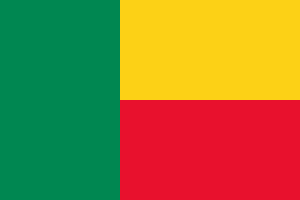Difference between revisions of "Language/Fon/Grammar/How-to-Use-Have"
| Line 90: | Line 90: | ||
! Fon !! Pronunciation !! English | ! Fon !! Pronunciation !! English | ||
|- | |- | ||
| Mì gbé | | Mì gbé àmǐwéː. || Mi gbe amiwe || I will have a bike. | ||
|- | |- | ||
| Wé gbé | | Wé gbé mɛ̀ló ||wě gbe məlò||You will have food. | ||
|} | |} | ||
Diálògŭè: | |||
* Person 1: Tó gbe àkẹ̀tẹ̀ tó wó ní | * Person 1: Tó gbe àkẹ̀tẹ̀ tó wó ní awaà. || To gbe akete to wo ni awaa. (We will have lunch together tomorrow.) | ||
* Person 2: Wén gbé àjà | * Person 2: Wén gbé àjà nígbàdé? || Wen gbe aja nigbade? (Will you have a dog next year?) | ||
* Person 1: | * Person 1: Yóò, wé gbé àjà nígbàdé. || Yǒǒ, wě gbe aja nigbade. (Yes, you will have a dog next year.) | ||
Remember to practice the Fon grammar and to use [https://polyglotclub.com Polyglot Club] to [https://polyglotclub.com/find-friends.php?search=send&d=0&f=36&offre1=2053 find native speakers] and ask them any [https://polyglotclub.com/language/fon/question questions]! | Remember to practice the Fon grammar and to use [https://polyglotclub.com Polyglot Club] to [https://polyglotclub.com/find-friends.php?search=send&d=0&f=36&offre1=2053 find native speakers] and ask them any [https://polyglotclub.com/language/fon/question questions]! | ||
| Line 109: | Line 109: | ||
|description=In this lesson, we will learn how to use the verb "have" in Fon. Learn the Fon grammar with cultural information and interesting facts. | |description=In this lesson, we will learn how to use the verb "have" in Fon. Learn the Fon grammar with cultural information and interesting facts. | ||
}} | }} | ||
==Related Lessons== | ==Related Lessons== | ||
Revision as of 14:27, 12 March 2023
Hi Fon learners! 😊
In this lesson, we will learn how to use the verb "have" in Fon. This lesson is at an intermediate level, so if you are a beginner, please refer to the Grammar page to catch up on the basics.
What is the Verb "Have"?
The verb "have" is used to indicate possession, ownership, or experience of a particular event. In Fon, the verb "have" is translated to "gbe".
Example:
| Fon | Pronunciation | English |
|---|---|---|
| Mi gbe moto. | mi ɡ͡be moto | I have a car. |
Conjugation of "Have" in Fon
"Have" in Fon is translated to "gbe" and is conjugated as follows:
| Person | Conjugation | English |
|---|---|---|
| 1st Singular | Mì gbe | I have |
| 2nd Singular | Wé gbe | You have |
| 3rd Singular | Yìn gbe | He/She/It has |
| 1st Plural | Tó gbe | We have |
| 2nd Plural | Wén gbe | You all have |
| 3rd Plural | Yìn gbe | They have |
Example:
Diálògŭè:
- Person 1: Mì gbe ǎnɔ́.(I have a book)
- Person 2: Wé gbe ǎmí̆ná. (You have a pen)
Using "Have" in the Present Tense
In Fon, "have" is often used in the present tense to indicate current possession of something or an ongoing experience.
Examples:
| Fon | Pronunciation | English |
|---|---|---|
| Mì gbe òkú | mi gbe oku | I have a headache. |
| Wé gbe ěfè | wě gbe efe | You have a child. |
| Yìn gbe ěmì | yǐn gbe emi | He/She has a name. |
Diálògŭè:
- Person 1: Mì gbe ǎnɔ́ tǒnɔ̀. Mi bò mǎn.. (I have a big book. I will read it later)
- Person 2: Wén gbe ádǎ màn? (Do you have a dictionary?)
- Person 1: Yìn gbe ádǎ. (He/She has a dictionary)
Using "Have" in the Past Tense
In Fon, the past tense of "have" is expressed using the word "to". "To" is placed before the object that was possessed or the event that was experienced.
Examples:
| Fon | Pronunciation | English |
|---|---|---|
| Mi to àkókó. | Mi to akǒkǒ | I had a headache. |
| Yìn to ámì. | Yǐn to amí | She had a pen. |
Diálògŭè:
- Person 1: Mì gbe ǎbálín today. || Mi gbe abalin today. (I have a meeting today.)
- Person 2: Yìn to ǎbálín? || Yǐn to abalin? (Did she have a meeting?)
- Person 1: Yóò, yìn to ǎbálín. || Yǒǒ, yǐn to abalin. (Yes, she had a meeting.)
Using "Have" in the Future Tense
In Fon, the future tense of "have" is expressed using the word "gbé". "Gbé" is placed before the object that will be possessed or the event that will be experienced.
Examples:
| Fon | Pronunciation | English |
|---|---|---|
| Mì gbé àmǐwéː. | Mi gbe amiwe | I will have a bike. |
| Wé gbé mɛ̀ló | wě gbe məlò | You will have food. |
Diálògŭè:
- Person 1: Tó gbe àkẹ̀tẹ̀ tó wó ní awaà. || To gbe akete to wo ni awaa. (We will have lunch together tomorrow.)
- Person 2: Wén gbé àjà nígbàdé? || Wen gbe aja nigbade? (Will you have a dog next year?)
- Person 1: Yóò, wé gbé àjà nígbàdé. || Yǒǒ, wě gbe aja nigbade. (Yes, you will have a dog next year.)
Remember to practice the Fon grammar and to use Polyglot Club to find native speakers and ask them any questions!
➡ If you have any questions, please ask them in the comments section below.
➡ Feel free to edit this wiki page if you think it can be improved. 😎
Related Lessons
